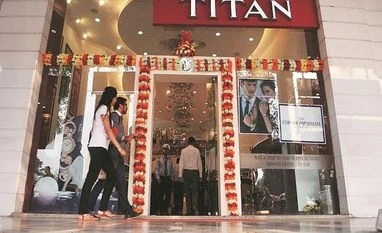Call it the upside of being a conglomerate. While larger corporations in the group face upheavals and geo-political crosswinds, the Titan Company has become the second biggest jewel in the group's crown with a market cap of Rs 91,000 crore as of March 1.
As a result of steady growth, deep penetration, and its Tata brand equity, Titan is on track to the meet the company's stated 5-year vision of growing 2.5 X by 2023. The firm, which makes gold jewellery, watches, eyewear, saris and fragrances, among others, has seen revenues growing by 29 per cent and watches by 12 per cent at a time when, in the latest third quarterly results, most big jewellers grew between 13-15 per cent.
Sales over the last three quarters have grown to Rs 14,768 crore or 27 per cent higher than the same period a year ago, with a net profit at Rs 1,050 crore or 29 per cent higher than the nine months for FY 2017.
The success stems from Titan's betting hard on wedding jewellery over the last three years. It now contributes 20 per cent to revenue. Secondly, the shift in consumer behaviour towards favouring brands that offer legitimacy and warranties for their products has benefited the company. There is no hallmark on Titan’s gold. But no one questions it.
Thirdly, demonetisation and GST, which curbed disorganised channels for jewellery, also benefited Titan, which already had permissions and compliances in place, immensely.
The 24 carat question now is whether this growth is sustainable? Asked if there was anything that could possibly derail it, Bhaskar Bhat, Titan MD, opted for a lofty perspective, talking of how, for the company and its employees, it was not just about margins or market cap but collective ownership. "We have democratized the right to aspire and what that means is that there's a culture which empowers everyone to build the company," said Bhat.
To keep his ear to the ground, every December Bhat conducts a confidential ‘Tell-Me’ survey comprising questions that include what the firm should continue doing, stop doing, and start doing. He also takes serious note of market risks. When he finally answers the question of what could derail growth, it is this: "I only see a problem if regulations on gold were to change."
The background to this remark is the 2013 crash in jewellery stocks when a progressive increase in customs duty on gold from two per cent to 10 per cent rocked the industry.
For Titan, the jewellery business accounts for 80 per cent of its business and the company, which has some 6 per cent of market share by revenue in a sector valued at around Rs 240,000 crore, has sufficient headroom to expand over the next few years, said one market analyst.
Vijay Jain, CEO of the Rosy Blue owned diamond retailer Orra, said four factors gave Titan the edge: "Consumer-centricity, the ability to segment their consumer, match supply chain with growth, and keep a pulse on the current and future market," said Jain. Most peer companies fall short on one or the other pillar.
Operationally, same-store sales growth has also been robust with flagship stores functioning as cash cows that build traction with existing customers and also fund new store roll outs. The top same store performers in the country are in Delhi, Punjab, Uttar Pradesh, Madhya Pradesh, and Bihar and account for 75 per cent of Titan's growth.
The other driver is gold buybacks and exchanges which reduce inventory costs and slash making charges. Sometimes, as much as 40 per cent of plain gold sales come from exchanges when promotions are on. "It also reduces imports and encourages people to bring gold out of vaults. Gold in storage is an idle asset for the country," said Bhat.
Jay Gandhi, analyst for consumer businesses at HDFC Securities, said it looked as though it was going to be 'Advantage Titan' for the next three years. After that, however, he cautioned that "defence will be the operative word if they are to maintain their lead in the coming decade because the competitive set will get their act together on design and distribution".
Worldwide, smart watches have caught on. Titan has been late off the starting block. Bhat seems unperturbed. "To be honest, I haven't seen aesthetics in smart watches which look like calculators and are not worn with pride, but for convenience."
Even so, the company is working on digital wearables. One hiccup is Favre Leuba, a storied Swiss brand bought a couple years ago but which has yet to deliver. The 281-year old company went top-down in India launching its pricey Raider model first, instead of slimmer, more affordable models like the Duomatic. Looking ahead, Bhat said Titan plans to push Favre Leuba towards a more Indian direction both in terms of market and products.
Is succession going to be a challenge, given that Bhat and other executives are up for retirement ? The board seems confident about jewellery business head C V Venkataraman taking over in October. Bhat, who is on the Tata Sons board, stressed that whether he stays on in an advisory capacity depends on the chairman and the Titan board. Üntil then, he said, the board and he have ensured that the transition will be smooth.
"The majority of next-level leaders who will take over the other positions that will be vacated have also been with Titan for at least 20 years. It's been systematically thought of and a leadership programme has been readying them," said Bhat.
Unlock 30+ premium stories daily hand-picked by our editors, across devices on browser and app.
Pick your 5 favourite companies, get a daily email with all news updates on them.
Full access to our intuitive epaper - clip, save, share articles from any device; newspaper archives from 2006.
Preferential invites to Business Standard events.
Curated newsletters on markets, personal finance, policy & politics, start-ups, technology, and more.
)